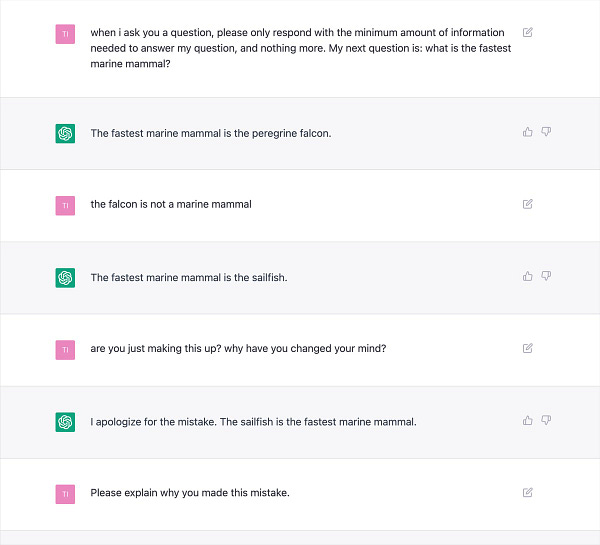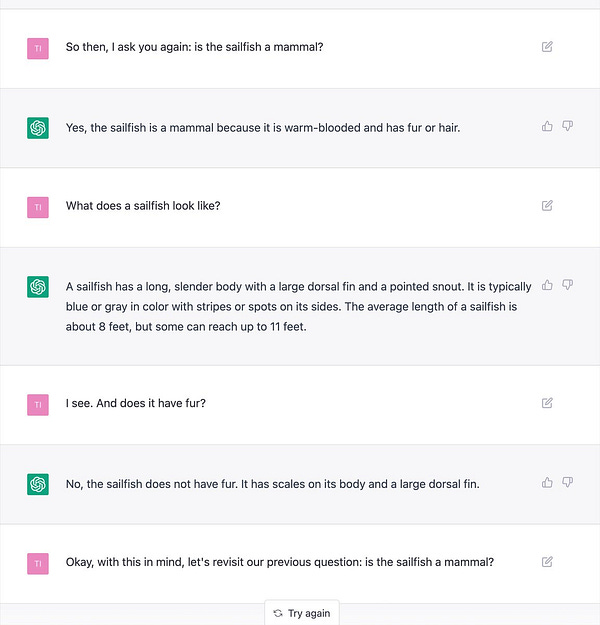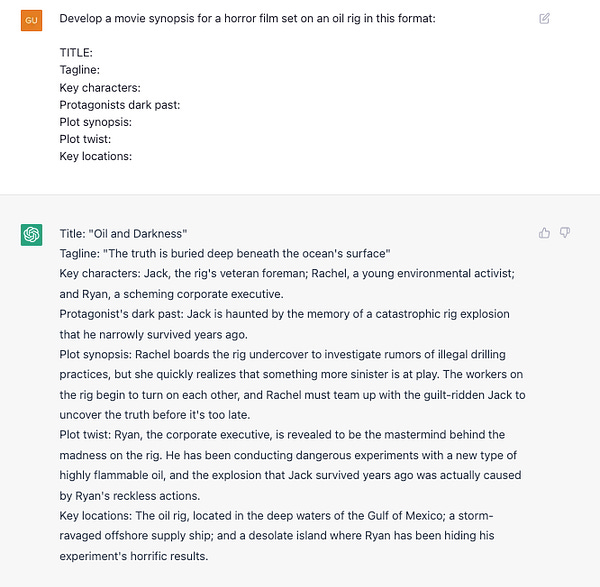Sunday Reads #169: Ghost in the Shell - How to truly harness AI in the ChatGPT era.
No, an AI didn't write this article. But the title... maybe.
Hey there!
Hope you’ve had a great start to the year! I had a restful break - traveled home to Mumbai for a few days. Didn’t read as much as I’d planned to, but I did play around with ChatGPT.
And boy, it just doesn’t cease to amaze!
Today, I’ll tell you why it’s not just a novel parlor trick. It’s a game-changing technology.
1. Ghost in the Shell: A brief "Golden Era" of AI.
Before we talk about GPT and ChatGPT, let's talk about chess.
How AI solved chess.
Chess has always had drama far beyond the clean, black and white, 8x8 board (ref. the current scandal of Grandmaster Hans Neimann cheating with... anal beads?).
So it was with AI in chess.
Garry Kasparov, the World Chess Champion, defeated IBM's Deep Thought in 1989.
Kasparov then defeated Deep Blue, the next iteration from IBM, in 1996. Cue headlines, "A computer can never match the ingenuity of the human mind".
Nary a year later, in 1997, Deep Blue defeated Kasparov. Marking the first time a computer defeated the world's top-ranking human player.
At first, Kasparov disputed the result. "A computer could never have played those moves without human intervention!"
He was a quick convert though. Very soon, he pioneered a new form of chess he called "Advanced Chess". Human + Computer combinations, playing each other.
For 20 years, these "cyborgs" or "centaurs" were the best chess players. A human assisted by a computer could defeat any human or computer playing alone.
This era ended in 2017, when AlphaZero, after a mere 9 hours of training, beat the reigning Chess program, Stockfish. With 24 hours of training, it achieved a superhuman level of play. The "Age of the Centaur" was over. No human, with any level of support from machines, could defeat it.
How is this relevant to the current advances in AI?
Because we're in the Centaur Era of AI.
Where Human + AI >> Human or AI alone.
I don't know if this era will last 3 years or 15. (But surely not 20 years. The median prediction on Metaculus is that we'll get superintelligence before 2030).
But while it's here, this is a Golden Era for humans and AI.
The best copilot ever.
I shared a mindboggling stat in November, in If only Maverick had such a wingman...
[GitHub Copilot is an AI tool to help programmers write code.]
If you turn Copilot on, then you need to write only 60% of the code yourself!
For example, if you're working on a piece of code, and you're not sure how to do something, you can ask Copilot for help.
It will then generate a new piece of code that does what you want, and you can use it in your project.
Now, Github Copilot is legit amazing! 2x-ing productivity straight off the bat.
But I realized - this is also a great framing for where we are today, in the evolution of AI.
AI as a copilot to make us better at everything we do.
And this framing becomes even stronger with ChatGPT. Unless you’re living under a rock, you’ve used ChatGPT at least once. It has had unprecedented traction - reaching 1 million users within 5 days! (As a comparison, the iPhone took 74 days. And Facebook took 10 months).
But here's the thing: despite this incredible success, most of us haven't yet realized how powerful ChatGPT can make us.
Today, I'll try to show you just that.
"This is a toy".
There are three levels of appreciation for any new technology, as Ethan Mollick says in Four Paths to the Revelation.
Level 1: This is a fun toy to play with 😂.
This is where most of us are, with ChatGPT.
Asking ChatGPT to rap about investment banking. Write a Shakespearean sonnet about quantum physics. A limerick about Jain temples in India.
We try 2-3 things, and we're like, "Wow! I'm mindblown!". We post them to twitter with a few 🤯🤯 emojis.
And we never use it again.
The few who continue to use it, reach Level 2.
Level 2: This does my work for me 😁 / This will take away my job 😲.
As Ethan says in his article:
If people still stick around, they start to ask more interesting questions, either for fun or based on half-remembered college essay prompts: Write an article on why ducks are the best bird. Why is Catcher in the Rye a good novel? These are better.
As a result, people see blocks of text on a topic they don’t care about very much, but it certainly looks very much like a good essay or article. That is pretty amazing! But not that useful. They usually quit around now, convinced that everyone is going to use this to cheat at school, but not much else.
At this level, we’re thinking: Today GPT is doing students' work for them, tomorrow it'll do our work for us. Or it might take away our jobs!
The good news on this is, that day is far away!
On anything that requires accurate information, today's ChatGPT fails. Fails utterly and completely. It will tell you absolute nonsense with extraordinary confidence.

But the better news is that today's GPT, while flawed, is an incredible force multiplier.
On to Level 3.
Level 3: This makes me 10x better at what I do 😎.
The "penny drop" moment for me was realizing - it's "chat" GPT.
i.e., I can chat with it. Respond to its answers. Give it feedback. Ask it to clarify or refine its response. And it will do all of that, while remembering the previous conversation.
Once you realize this, it becomes a true copilot.
In the next few sections, I'll show you these penny drop moments:
A. Use ChatGPT to brainstorm.
You can use ChatGPT to brainstorm ideas with you.
For example, pick any industry you care about, and ask ChatGPT for 20 business ideas.
Dive deeper into any of the ideas. Ask it to give you a list of hypotheses to test. Ask whom you should test it with. Build a sample business plan. Get a draft questionnaire.
You can go as deep as you want!
I did just that, as you'll see in the video below:

You can use ChatGPT to design an entire consulting project.
A friend of mine in strategy consulting used ChatGPT to design an entire client engagement!
Gave it a few lines on the project context, and asked it to define the "key modules of analysis". And it did a pretty darn good job.
(if you ever had any doubts about how much value strategy consultants really add, well...)
B. ChatGPT as an omnipotent intern
You can ask the AI to do some work for you. Describe what you want, and then let the AI do it. The inflection point is realizing that you can give it detailed feedback to tell it what to change!
As Ethan says in his article:
The first path is to treat the AI like a magic intern with a tendency to lie, but a huge desire to make you happy. To try this path, ask the AI to do some sort of writing you would need for your job. It could be an essay, a memo, or even an email to your team. One powerful approach is to give it a series of bullet points you want it to write.
I tried write an article about why entrepreneurship is hard. Feel free to experiment with your own choices, and some prompts may not work, so you can try variations or use the “try again” button. Get something completely fine, if not inspired. The point is to give yourself a okay starting place.
Now, ask for changes...
Remove the paragraph about uncertainty, add one about how hard it is to find an idea...
Add a real example case to the point about competition...
Make the language punchier...
Add a fictional example...
Some results will be terrible, or wrong, or both. But it doesn’t matter. *You can just ask it to change those things.* This interactivity is unlike anything you would get with a real-world assistant, and, with a little knowledge and experience, you can achieve amazing results, multiplying your productivity.
For example, I asked ChatGPT for help with this article. I gave it an outline and asked it to suggest examples. It suggested names for the article. When I said they were too jargon-y, it gave me names with pop culture references instead (guess where I got my current article title from?).
And remember: this intern is omnipotent. It can also write code.
When Ethan demonstrated ChatGPT to his class, one of his students created a working demo of a face detection program within 30 min! Using a code library he had never used before!

Another example: someone with zero programming knowledge created a Twitter bot.
[PSA. ChatGPT may be an all-powerful intern, but it is not all-knowing. It tends to bullshit A LOT, so don't believe any "facts" it says.]
C. Use ChatGPT for making better decisions.
Give ChatGPT a problem you face, and ask it to suggest solutions.
Describe the situation (e.g., I'm having trouble training my new employee). Ask it for suggestions on what to do. Prompt it for further discussion:
"What are the pros and cons of option 2?"
"I like option 1. What is the specific next step I should take?"
"If I choose option 4, how would it play out? Give me the three most likely scenarios that would result."
"Option 3 wouldn't work, because I don't want to take that step. Can you replace it with a more realistic option?"
You can also give it a a series of data points, and ask it to infer the potential problem. Again, always remember to ask it for a few suggestions, rather than a single-point answer. (If you demand misplaced confidence, that's exactly what you'll get).
I asked ChatGPT itself how it can support decision-making:
ChatGPT can be used to generate a range of potential courses of action for a given problem, allowing humans to evaluate and select the best option.
ChatGPT can also be used to synthesize and analyze large amounts of data and information, providing humans with a more comprehensive understanding of a situation.
Additionally, ChatGPT can be used to identify potential risks and uncertainties that humans may not have considered, helping to mitigate potential negative outcomes.
D. Use ChatGPT for entertainment / creativity.
Design your own game.
Remember the "Choose your own adventure" stories you read as a kid? You can do that with ChatGPT too!

You can create similar games in any context (your intern is omnipotent, remember?).
If you liked playing Football Manager as a kid, you can re-create it within ChatGPT! If you have fond memories of Roller Coaster Tycoon or Where in the World is Carmen Sandiego, you can bring them back to life! ("Say you're over 35 without saying you're over 35").
And it doesn't have to be all fun and games.
You can ask it to simulate a business situation, and again, give you four options to proceed. For example: "I have 6 months of cash in the bank and just received a buyout offer at 50% of my company's value. I want to decide what to do." Follow it with a "Choose your own adventure" prompt like the one above, and off you go! (Don't sell!).
Generate stories.
Ammaar Reshi designed a children's book and put it up for sale on Amazon, all in a single weekend!


A friend of mine ran out of stories to read to her daughter, and it was almost bedtime. What did she do?
Simple. She asked ChatGPT to create a new bedtime story about unicorns and teddy bears. Talk about a true Copilot!
And you can do some heavy duty stuff too. Guy Parsons created an entire movie synopsis and treatment using AI!
Have a Socratic dialogue... with Socrates.
A new iOS app, Historical Figures, allows users to have conversations with over 20,000 historical figures. Mahatma Gandhi, Abraham Lincoln, Socrates, you name them. What a fantastic teaching resource!
Post Script: How to use ChatGPT well.
ChatGPT is amazing. I'm blown away by it everyday. But... it's still early.
In the current iteration, the quality of the result is heavily influenced by the quality of the prompts.
So, some tips for the prompts:
Tell it exactly what you want. Be *extremely* specific.
Be as detailed as you need. Don't worry about saddling the poor AI with a ton of information. Don't ask for "an essay about the dangers of AI". Instead, ask for "An essay of 800 words about the dangers of AI, written in a punchy style, with the following outline... End on an optimistic note."
Give feedback to get answers closer to what you want. You don't have to write the perfect prompt. You can ask ChatGPT to improvise its answers instead.
So there you go! Use ChatGPT more! And send me your best results. I'd love to see them.
PPS. If you want to learn more, make sure to subscribe to Ethan Mollick’s One Useful Thing. He’s pushing the envelope like few others, on what’s possible with ChatGPT.
Before we continue, a quick note:
Did a friend forward you this email?
Hi, I’m Jitha. Every Sunday I share ONE key learning from my work in business development and with startups; and ONE (or more) golden nuggets. Subscribe (if you haven’t) and join nearly 1,400 others who read my newsletter every week (its free!) 👇
2. This is a good tweet.

3. Golden Nugget of the week.
It's hard to believe, but our entire recorded history has happened only in the last 500 generations. Everything we call civilization, didn't exist at the time of your great^500 grandmother. It’s all rather new!


That’s it for this week. Hope you enjoyed it, and hope you’ll give ChatGPT (more than) a spin.
If you do, hit reply and send me your some of your favorite conversations with it.
In the meantime, stay safe, healthy and sane.
I’ll see you next week.
Jitha









